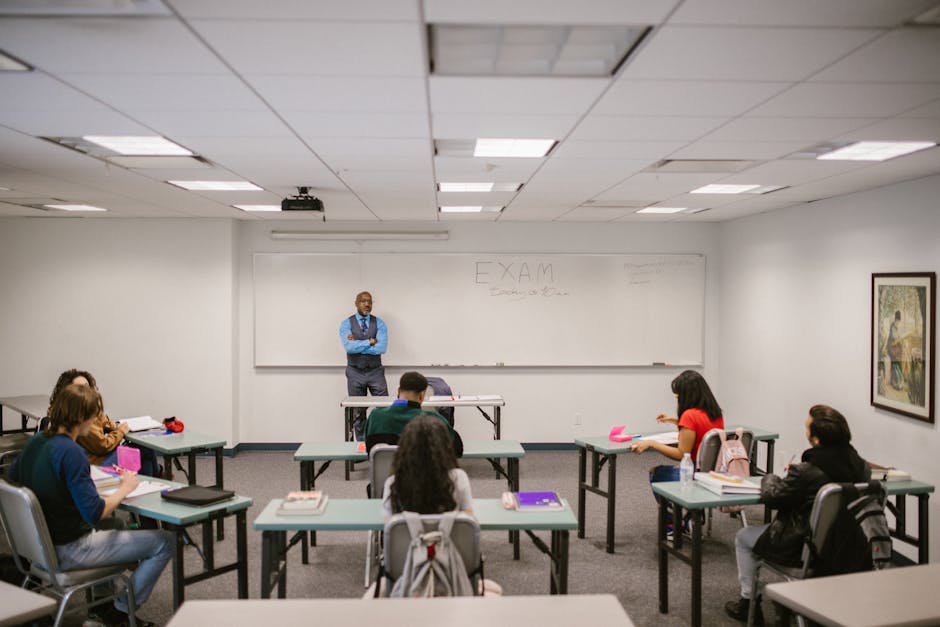Breaking Down Gifted School Test Sample Questions
Today’s topic has a sprinkling of brilliance - we delve into an exciting realm of education, specifically, gifted school tests .
This sphere may seem intricate at first glance, with its unique structure and challenging questions. Yet, it is indeed an opportunity for young minds to discover their capabilities.
Understanding such exams is not just about grasping the concept but also about frequently exposing oneself to sample questions.
This way, they're able to familiarize themselves with the exam format, ultimately turning a seemingly daunting task into a challenge they look forward to conquering.
Together, let's navigate this world of 'Gifted School Test Sample Questions.
Gifted School Testing

Understanding the intricacies of gifted school testing can be daunting. It involves assuring that your child is cognitively capable to thrive in a fast-paced educational environment.
Gifted school testing typically consists of cognitive assessments. These could assess abilities like abstract thinking , problem-solving and reasoning skills, which are often beyond the scope of regular school curriculums.
Two common tests are the Otis-Lennon School Ability Test (OLSAT) and the Cognitive Abilities Test (CogAT). The OLSAT tests logical thinking and reasoning skills while the CogAT assesses abilities to understand and solve problems, making them integral to most gifted school admission processes .
Next, we'll delve into some sample questions, providing insights into the kind of skills that these tests are looking to evaluate. Stay tuned.
Sample Questions: Gifted School Math

In this section we delve into some examples of Math questions found in a typical Gifted School Test.
Question 1: Billy has 5 apples and Megan has 3 apples. How many more apples does Billy have than Megan?
Question 2: If Emma has 10 chocolates and shares them equally with 5 friends, how many chocolates does each friend get?
Question 3: A container can hold 9 liters of water. If it's currently one-third full, how much more liters of water will it take to fill it up?
These are simple yet calculate examples of math queries your child might encounter. These questions test your child's understanding of fundamental mathematical concepts such as subtraction, division, and fractions. It's essential to guide learners through a myriad of test-like questions to boost their confidence and preparedness.
Verbal Reasoning Sample Questions

Verbal Reasoning Sample Questions are an excellent way for your child to prepare for an entrance exam at a gifted school.
Let's start with a couple of examples.
Sample Question 1: Which word is the odd one out: APPLE, GRAPE, LEMON, CARROT, BANANA?
The correct answer is CARROT because it is a vegetable, all the other options are fruits.
Sample Question 2: Complete the following series: z, x, v, ?, ?.
The correct answer is t, r. This is an alphabetical series moving backward skipping one letter .
By answering such questions, your child can hone their skills in understanding relationships between words or ideas, draw logical inferences, or predict outcomes. Practice makes perfect, as they say. Let's move to the next section, where we dive deeper into non- verbal reasoning questions .
Non-Verbal Reasoning Test Examples
In the realm of non-verbal reasoning, puzzle- solving skills gain utmost significance . Let's try a few examples to hone our skills.
Example 1: Picture Puzzles. Look closely at the sequence of pictures. Can you identify the pattern and determine what the next image should be?
Example 2: Spot The Difference. Two scenarios may look identical, but there are subtle distinctions. Your job is to identify the differences.
Example 3: Shape Sequencing. This requires recognizing patterns in an arrangement of shapes. Can you guess the next shape in the sequence?
Each question is designed to challenge your ability to infer and project, based on the data available. Remember, the key to acing these tests is practice. The more you immerse yourself in such questions, the sharper your reasoning skills become .
Spatial Visualization Sample Questions

Spatial visualization is a key skill for talented and gifted tests, essential for problem-solving and comprehending complex information. Let's explore some examples.
1) Picture folding: Imagine a square paper folded in half and then in quarters. If a hole is punched in the center, how would it look when unfolded?
2) Rotating Figures: If a three- dimensional cube rotates 90 degrees to the right, how would it appear?
3) Identifying Similarities: From a group of shapes, select the pair that has the same relationship as a provided pair.
Please, remember that there could be multiple correct answers. Though it might be tricky, practice these spatial visualization questions diligently to hone your skills. Perfecting your ability to mentally manipulate objects and see spatial relationships can greatly improve your performance in a gifted school test.
Gifted School Quantitative Reasoning Questions

In the evaluation for gifted schools, prospective learners encounter quantitative reasoning questions . These are geared towards evaluating a child's ability to establish logical connections and extrapolate data based on given conditions.
For instance, a typical question might pose : "John has twice as many candies as Mary. If Mary has five candies, how many does John have?" Such questions gauge a child's comprehension of numeric relations.
Alternatively, pattern discernment questions ask students to identify the subsequent number or shape in a series. These sequences can be linear ("What comes next in the series: 2, 4, 6, 8...?") or more complex, requiring a deeper understanding of mathematical rules.
All in all, excelling in these sections of the gifted school test is indicative of a child’s ability for higher-level, analytical thinking.
Critical Thinking Questions Examples

Under the umbrella of critical thinking, students are put into situations where they must draw logical conclusions and make sound judgments . Let's delve into a few examples:
1. Sarah is 20 years younger than Kathy. In 5 years, Kathy will be twice as old as Sarah. How old are they now?
This question tests comprehension of complex relationships and perspective-shifting - key aspects of excellent critical thinking.
2. The dog chased the cat up a tree. What can you infer from this statement?
This question nudges the student to infer and deduce, which are critical thinking cornerstones.
3. If all swans are white and I own a swan, what color is it?
This question challenges one's understanding of logic and structure within language , which aids overall critical thinking .
Remember, practice is key, and the more problems a child works through, the stronger they become in strategic and logical thinking.
Preparing for Gifted School Test

Sailing through the Gifted School Test requires more than just sheer intelligence. It’s critical to prepare yourself beforehand, to ensure you're at the top of your game.
Firstly, identify your strengths and arm yourself with knowledge in areas where you need improvement. Have a comprehensive understanding of the content and format of the test. Familiarize yourself with the type of questions asked and the time you will be allotted.
Invest in practice tests . Just like any other exam, practice makes perfect . The more you expose yourself to the style and standard of questions, the calmer and more prepared you'll be on the D-day.
Remember, the aim is not just to pass but to excel. So, it’s okay to take breaks , maintain a healthy lifestyle, and get plenty of sleep! Your mind needs to be as sharp as possible on the day of the test.
